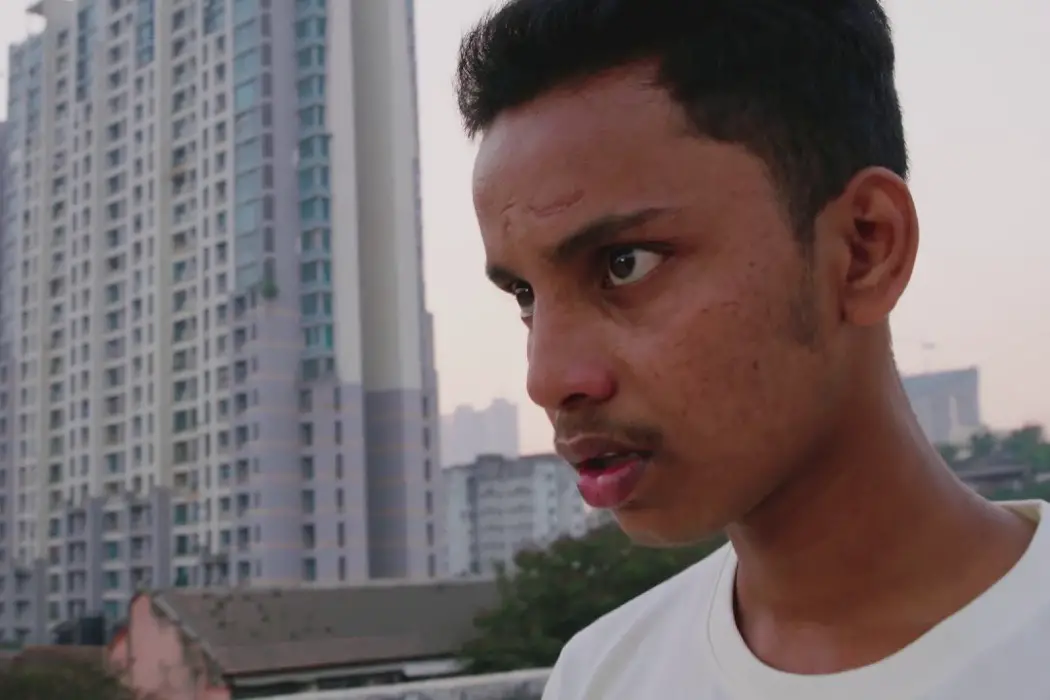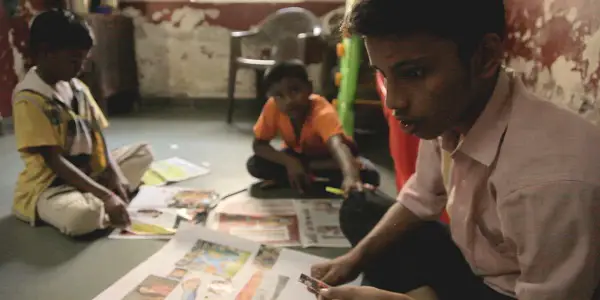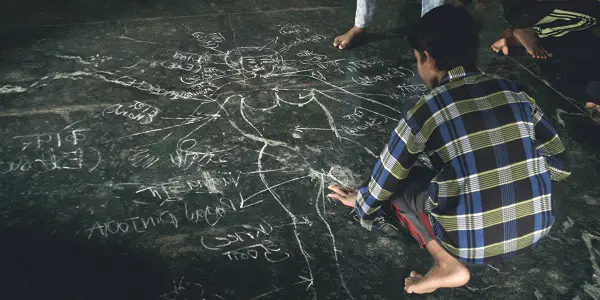Sheffield Doc/Fest 10: Interview With Inka Achté, Director Of BOYS WHO LIKE GIRLS: “It Isn’t Easy To Dismantle Decades Of Tradition”

Musanna Ahmed is a freelance film critic writing for Film…
Harish Sadani is a hero.
For over 20 years, the Mumbai-based activist has been fighting for equal rights with his organisation Men Against Violence and Abuse. MAVA educates young men and boys about rape, gender-based stereotypes, slurs, abuse of power and other pressing gender-based issues to breed new generations of feminist men.
Referencing India’s patriarchal society, Sadani acknowledges that men have power in the system so teaching males why gender equality is beneficial for everyone is his approach to employing his philosophies. Following various characters involved with the boys club set up by the organisation, including teenage student Ved and mentoring social worker Aspar as well as Sadani himself, Inka Achté’s brilliant, urgent new documentary Boys Who Like Girls provides a significant overview of MAVA’s work through detailed character examinations. Boys Who Like Girls is undoubtedly a timely work in cinema following the #MeToo revelations but the ugly truth is that these topics have been relevant long before.
Achté’s film is set a few years ago, 2013 – 2014, following the horrific 2012 gang rape in Delhi. The case received international attention and protests took place throughout India. Following the legal proceedings, there was a lot of discussion on the ways to prevent similar horrific events in the future with ideas such as widening the definition of rape, introducing fast-track courts and tighter policing brought to fruition. Boys Who Like Girls looks into one of the most necessary ways possible to change things – education. While we had a chance to speak with the film’s director below, you can read more of Film Inquiry’s review of Boys Who Like Girls by clicking here.
Interview with Inka Achté
I spoke to director Inka Achté at the festival and discussed Harish, the support for MAVA, the lasting effects of the boys’ education, working in India, and her next film.
Musanna Ahmed for Film Inquiry. So, you started making the documentary many years ago. How did it all begin?
Inka Achté: It began in 2012, when I was reading about the New Delhi gang rape. I discovered that there’s this men’s movement in India and I felt super inspired, happy and grateful that there are men who care about this issue. I spoke to Harish and a few different people, like a guy in Afghanistan who’s doing something a little bit similar, but Harish stood out to me when I met him in Mumbai and we agreed to work together. I contacted producer Liisa Karpo and she teamed up with me, and started to gather the funding.

You speak of being grateful that there are men caring about this issue – one of the most affecting scenes for me was when Harish doesn’t find funding for MAVA in the Denmark conference after they’re only offering funds for women and transgender-led organisations. How did you feel when you saw that?
Inka Achté: I knew to expect that because I had spoken to Harish before and he gets that answer a lot. Of course, it’s frustrating and I can’t believe that there’s no resources for him. Frustrating, but not entirely surprising.
What do you think viewers can do to support MAVA?
Inka Achté: They can give individual donations and we also have a link to a fundraising page. I really hope that somebody who knows about fundraising or running an NGO can team up with Harish and create a more sustainable future. I think the problem is that there isn’t a continuity in the financial support, so it’s hard for him to run long-term projects. For example, the project with Ved had to be cut because of funding and I do think that many of those boys drifted back to their old mindsets as a result. I think for real big impact, those boys need to be supported for several years.
To follow up on that point – do you have any insight of the lasting effects of the education provided by MAVA?
Inka Achté: It depends. Some guys that Harish has trained or mentored have actually started their own similar NGO’s in rural India, like talking to women about menstruation which is a huge taboo, and basically carrying on Harish’s legacy. Some of them drift off and don’t continue on that path. What hit me hard during the making of this film is that what Harish is up against is decades and decades of traditions, religion, caste systems, etc and other stuff which isn’t easy to dismantle or even shouldn’t be completely dismantled.
I’m curious to know, since he’s been doing this work for a long time, if other filmmakers have approached him.
Inka Achté: No, I don’t think so. Not as far as I know.
By making this film, did you feel that you enabled him to spread his message where it may not be otherwise heard?
Inka Achté: Yeah and I really hope that the film will do well. The attention we’ve received in Sheffield has been incredible. Not just for me as a filmmaker but because I think there’s a huge responsibility that I have towards Harish because he’s been endlessly patient, and has been letting us film him for years, and somehow it will pay off in the end. That’s my hope.

Since you’ve been shooting for years, were there any important aspects of this story that you’ve had to cut?
Inka Achté: I had to simplify the film because it was quite complex to put together. We have three key characters and a lot of Aspar’s story had to be cut out because we were getting side-tracked from the core narrative. What I found really interesting about Aspar was he’s a devout Muslim and goes to the mosque several times a day and he was really negotiating in his mind what the Quran says and what he does for work and if there’s any disconnect between the two, interesting things like that we had to cut out. Plus, a lot of funny scenes with Harish.
Working in India, was there a language barrier?
Inka Achté: Yeah, that was absolutely evident in the beginning, but we very quickly got an Indian crew on board and an Indian co-producer and they were vital in the communication. I think there would have been so many more misunderstandings and miscommunications if she hadn’t been on board. We managed to make the film successful because of the local crew.
Forgive me if this is presumptuous but, with an Indian crew on board and you as the director, did anyone there have a similar mindset to the boys’ pre-education about having a woman in charge?
Inka Achté: No, I didn’t witness that at all. The local co-producer was an extremely strong female so maybe it wasn’t unheard of to have a woman in charge. Also, I think that Mumbai is quite a liberal place. Actually, I’ve faced more of that in Finland, where I’m from. Like when we made our previous film in a men’s homeless shelter, they were always like, “Oh are you students or assistants or something?”
Let’s talk about Ved. I can understand why he’s an intriguing character to follow, considering the circumstance he’s in, but what were his reasons to share his story and how easy was it for him to do that?
Inka Achté: I’m not sure, why do people want to be filmed? I guess it’s a special attention or maybe a curiosity. I think he’s probably quite flattered that we find his story worthy because his self-esteem wasn’t very great in the beginning. It helps people feel like they matter and that’s important because everybody should feel that way.
Certainly. Were there any other subjects who you were also tracking to the same extent?
Inka Achté: Before we decided on Ved, we were exploring the option on having his friend Rajesh as the main character but he was a lot more of a happy-go-lucky guy who didn’t embody the same kind of conflicts so that’s why I chose Ved. Otherwise, I was quite clear from the start that these were the central characters.

I believe you’ve screened this film in India. What was the reaction?
Inka Achté: It was a private screening for the people in the film. They really loved it. The feedback was super positive.
What do you hope is the ultimate impact of the film?
Inka Achté: The ultimate impact would be that similar work would become common in schools in Europe and I think it should be part of curriculum to talk about gender issues and gender bias. Another ultimate goal is that there’s some sustainable development in Harish’s work so he doesn’t have to struggle and that people see the worth of his work.
I see that, considering your previous films, there’s a thread in social issues revolved around men.
Inka Achté: Yeah. I don’t know why that is. [laughs] I don’t know what that fascination is but there clearly is something going on there. [laughs] Maybe I’m just curious about men.
This film took a few years to make and in general, documentaries can take a long time as you know. Do you have anything else in the works?
Inka Achté: Yes. We are working together on our next project which follows the story of a guy who came to Finland 25 years ago from Somalia and two years ago he discovered that his family’s land is full of gold and copper and he decided to move his entire family back to Somaliland, including his four children who are all born in Finland. That is a massive culture shock for them, so it’s about them and whether they’ll find gold and whether they’ll settle in Africa. It’s about cultural identity and fitting in.
Now that’s quite thematically different to your previous films. My last question is, what is the best advice you can give to aspiring filmmakers?
Inka Achté: You have to be stubborn. A friend of mine, who’s a filmmaker, once said that the big secret is that it’s not necessarily the most talented that succeed, it’s the most stubborn. The other thing which I find really important is to not make films about somebody who you think is strange or weird or about an issue that you don’t understand. It’s really important to, if not like, at least understand your characters and where they’re coming from, and approach them with empathy and compassion rather than despising or laughing at them.
Film Inquiry would like to thank Inka Achté for her time and insight.
Doc/Fest 10 is a series of combined review and interview features for ten films seen at the Sheffield International Documentary Festival 2018. You can view the rest of the features by clicking here.
Does content like this matter to you?
Become a Member and support film journalism. Unlock access to all of Film Inquiry`s great articles. Join a community of like-minded readers who are passionate about cinema - get access to our private members Network, give back to independent filmmakers, and more.
Musanna Ahmed is a freelance film critic writing for Film Inquiry, The Movie Waffler and The Upcoming. His taste in film knows no boundaries.













